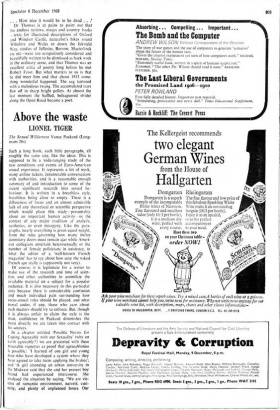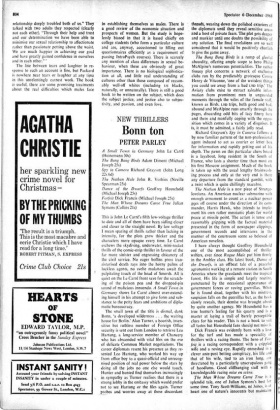Above the waste
LIONEL TIGER
Such a long book, such little paragraphs, all roughly the same size, like the ideas. This is . supposed to be a wide-ranging study of the new conditions and events of Euro-American sexual experience. It represents a lot of work, many airline tickets, innumerable conversations with authorities, and is a reasonable enough summary of and introduction to some of the recent significant research into sexual be- haviour. It is written in a breathless. style, breathless being close to empty. There is a diffuseness of focus and an almost admirable lack of any theoretical or scientific perspective which would place this study—presumably about an important human activity—in the context of any major tradition of analysis, aesthetics, or even misogyny. Like the para- graphs, nearly everything is given equal weight, from the rules governing how many iticlies dormitory doors must remain ajar while Ameri- can collegians entertain heterosexually or the number of female politicians in existence, to what the editor of a 'well-known French magazine' has to say about how sexy the naked French ape really is (apparently not very).
Of course, it is legitimate for a writer to make use of the research and time of scien- tists and other authorities to assimilate the available material on a subject for a popular audience. It is also necessary in this particular area because there is considerable confusion and much individual pain surrounding how socio-sexual roles should be played, and what moral codes, if any, those who care about such matters should try to enforce. But, though it is always unfair to claim the style is the man, confidence in Packard diminishes the more directly we are taken into contact with his sources.
In a chapter entitled 'Possible Norms for Coping Agreeably with our Sexuality' (why on earth agreeably?) we are presented with these miserable vignettes as proof that agreeableness Is possible : 'I learned of one girl and young man who have developed a system where they have agreed to take turns applying the brakes'; and 'A girl attending an urban university in the Midwest said that she and her present boy friend had experienced intercourse. She analysed the situation by saying, "We are vic- tims of romantic environment, naiveté, curi- osity, and plenty of unplanned hours. Our relationship deeply troubled both of at" They talked with two adults they respected (clearly not each other). "Through their help and trust and our determination we have been able to minimise our sexual relationship to affectionate rather than passionate petting above the waist. We are much happier in achieving our goal and have greatly gained confidence in ourselves and in each other."'
The line between tears and laughter in re- sponse to such an account is fine, but Packard is nowhere near tears or laughter at any time in this unrelentingly earnest work. The book is useful, there are some promising treatments about the real difficulties which males face
in establishing themselves as males. There is a good review of the economic situation and prospects of women. But the study is hope- lessly biased in that it is based chiefly on college students (who form a particular culture and are, anyway, accustomed to filling out questionnaires efficiently as a requirement of passing IntroPsych courses). There is scarcely any mention of class differences in sexual be-. haviour, when these are obviously of great importance. There is no biological sophistica- tion at all, and little real understanding of cultures other than those composed of reason- ably well-off whites (including us blacks, naturally, or unnaturally). There is still a good book to be written on the subject, which does the subject justice, and justice also to subjec- tivity, and passion, and even love.



































 Previous page
Previous page